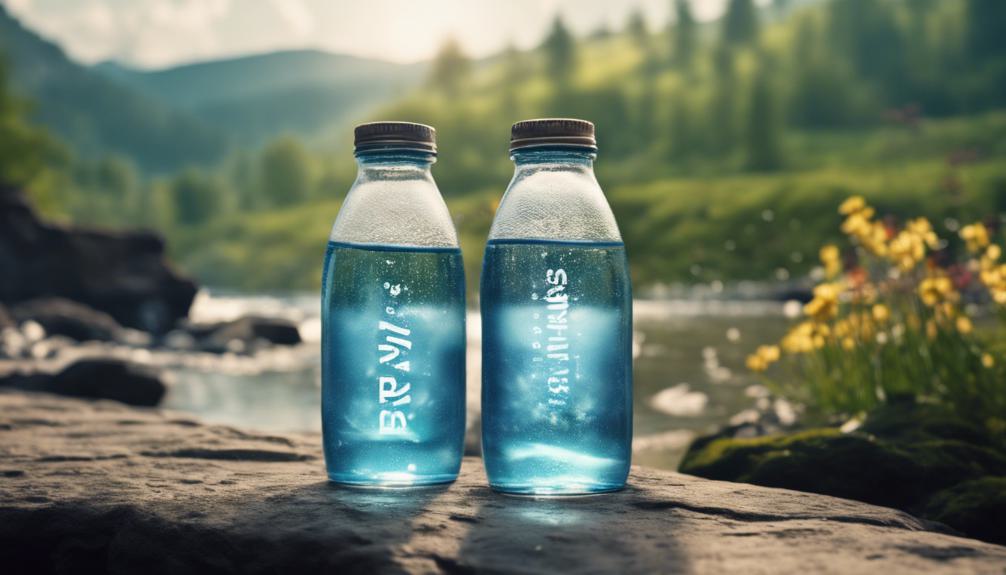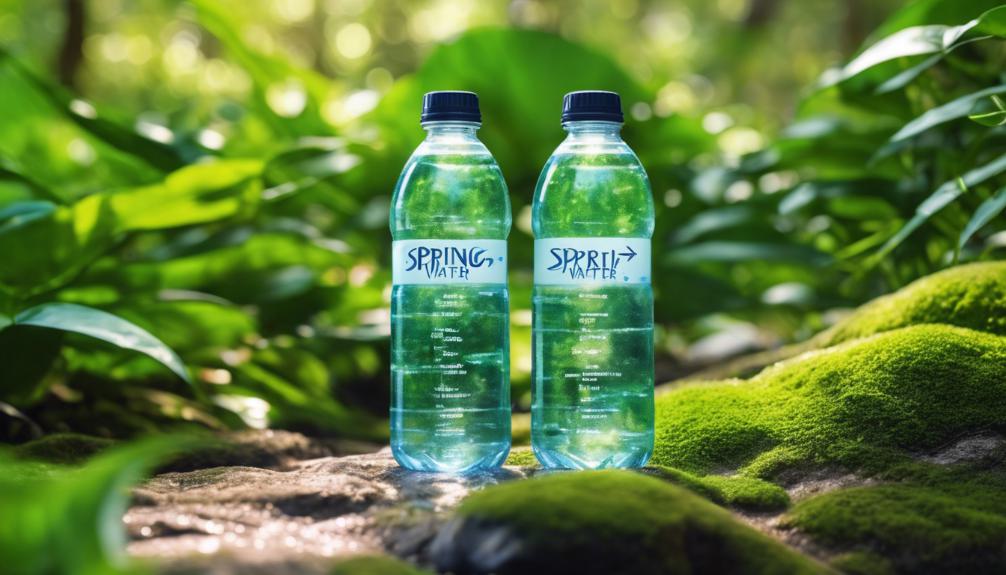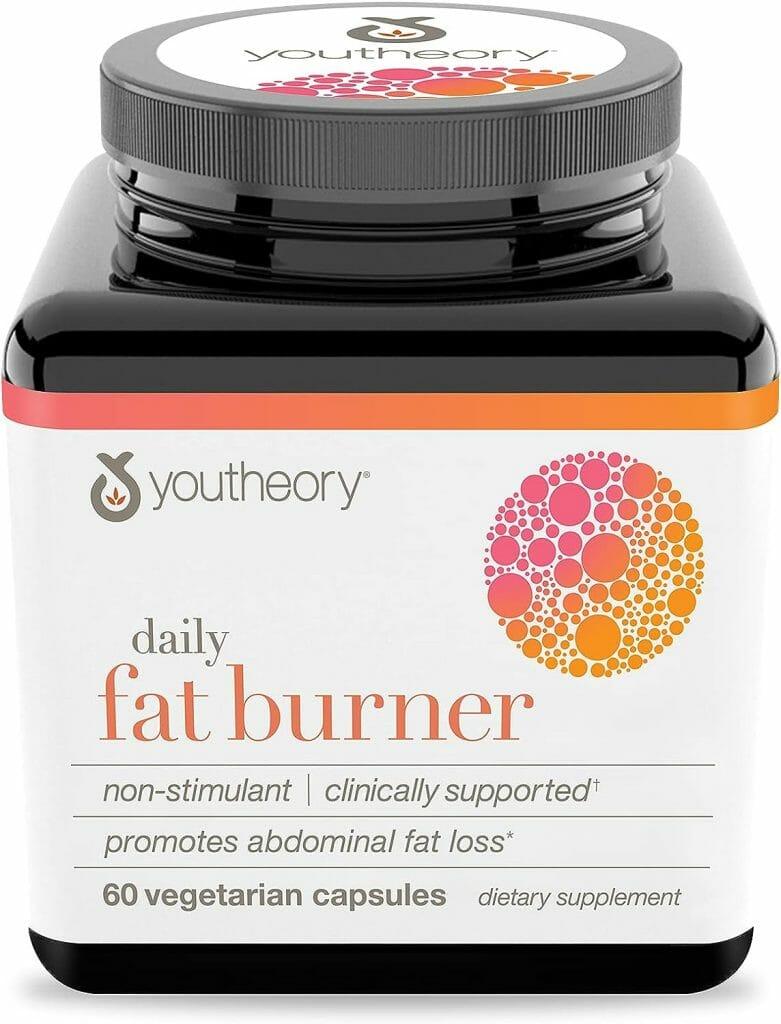Spring water is rich in essential minerals like calcium and magnesium important for bone strength and hydration. Purified water goes through processes like reverse osmosis that reduce mineral content. Spring water generally has higher natural minerals compared to purified water. Both have an impact on the environment, with purified water often having a higher carbon footprint due to energy-intensive treatments. Your choice may depend on factors like taste, health benefits, and convenience. Consider mineral content, environmental impact, and personal preferences when choosing between spring water and purified water for best health. Make an informed decision based on these factors.
Health Benefits of Spring Water
Spring water provides essential minerals like calcium, magnesium, and potassium, supporting your overall health and well-being. These natural minerals are vital for bone strength, muscle function, and hydration.
Purification Processes for Water
When it comes to purifying water, various methods are employed to guarantee its safety and quality.
Filtration methods like reverse osmosis and activated charcoal filters play vital roles in removing impurities.
Chemical treatment techniques such as chlorination are also commonly used to eliminate pathogens from water sources.
Filtration Methods
For water purification processes, various methods like reverse osmosis, deionization, and UV treatment are employed to eliminate impurities and guarantee water quality.
- Reverse osmosis traps bacteria, viruses, and minerals.
- Activated charcoal filters remove sediment and gases.
- Membrane openings in reverse osmosis systems are smaller than in traditional filtration systems.
Chemical Treatment Techniques
After discussing filtration methods in water purification, the focus now shifts to the chemical treatment techniques used in the purification processes for water.
Purified water undergoes treatment such as distillation, deionization, and reverse osmosis, with the addition of chemicals to guarantee its safety for drinking. Referred to as demineralized, deionized, distilled, or reverse osmosis water, these processes effectively remove impurities and contaminants, meeting strict purity standards.
Comparison of Mineral Content

Spring water generally boasts a higher natural mineral content compared to purified water. When considering mineral content, keep in mind:
- Spring water’s mineral levels can vary by source and location.
- Purified water, especially through processes like reverse osmosis, may have reduced mineral content.
- Some individuals prefer spring water for potential health benefits attributed to its natural mineral composition.
Environmental Impact Considerations
“While spring water offers natural benefits, it’s crucial to recognize the environmental impact of bottled water consumption. Opting for tap water, coupled with reusable containers, can significantly reduce plastic waste and carbon emissions associated with bottled water.” – David Smith, Environmental Scientist.
Considering the environmental impact, purified water may have a higher footprint due to energy-intensive treatment processes involved. Spring water, sourced naturally, boasts a lower environmental impact.
Both types of bottled water transportation contribute to plastic waste and carbon emissions. Spring water’s minimal processing reduces its overall environmental footprint, contrasting with the energy consumption and greenhouse gas emissions of purified water treatment methods like reverse osmosis.
Consumer Preferences and Trends

Consumer preferences for bottled water are influenced by a variety of factors, including taste, health considerations, and convenience.
- Purified water’s thorough purification process is appealing.
- Some prefer spring water for its natural mineral content and unique flavors.
- The U.S. bottled water industry’s projected growth to over $94 billion in 2023 reflects consumer trends towards both options.
Expert Recommendations for Water Choice
When choosing between spring water and purified water, considering expert recommendations is key.
Experts can guide you on the health benefits of each type and help analyze the environmental impact of your choice.
Expert Water Recommendations
For those seeking the highest purity and rigorous purification processes for their drinking water, expert recommendations lean towards choosing purified water over spring water. When it comes to water treatment, purified water undergoes processes like distillation, deionization, and reverse osmosis. This guarantees a high level of clarity and purity.
Spring water, on the other hand, maintains natural minerals and flavors, catering to those who enjoy the taste of minerals in their water.
Health Benefits Considered
Consider the health benefits associated with different types of water when making your choice between spring water and purified water.
Spring water retains essential minerals like calcium, magnesium, and potassium, promoting hydration and mineral balance in the body.
On the other hand, purified water is free from impurities, making it ideal for individuals with compromised immune systems or specific health concerns.
Expert recommendations emphasize the natural mineral content of spring water and the high level of filtration in purified water.
Environmental Impact Analysis
Spring water’s lower environmental impact makes it a favorable choice over purified water, aligning with sustainable practices and reducing the overall burden associated with water production and distribution. When considering the environmental impact, opting for spring water can have several benefits:
- Requires minimal processing and packaging.
- Lower carbon footprint due to less energy-intensive processes.
- Potential for local sourcing, reducing transportation emissions.
Frequently Asked Questions
Which Is Healthier Purified Water or Spring Water?
When considering what’s healthier between purified water and spring water, remember that both offer benefits. Purified water undergoes rigorous purification, ensuring purity. Spring water, with natural minerals, provides essential nutrients. Choose what suits your needs best.
What Is the Healthiest Water to Drink?
For the healthiest water to drink, consider your preferences and health needs. Spring water offers natural minerals, while purified water is treated for purity. Choose based on what benefits you more and tastes best.
Why Is Spring Water Better Than Filtered?
Spring water is better than filtered because it naturally holds essential minerals and nutrients. It’s considered superior for hydration due to its natural properties. The natural filtration processes it undergoes through aquifers maintain its purity and quality.
Which Bottled Water Is 100% Spring?
When it comes to bottled water that is 100% spring, Thirsty Work’s offering is sourced from a natural spring near Wenlock Edge. The water is naturally filtered through limestone, ensuring high quality and purity.
Conclusion
When choosing between spring water and purified water, consider your health needs, environmental impact, and personal preferences.
Spring water offers natural minerals and potential health benefits, while purified water undergoes rigorous filtration processes.
Both options have their merits, so choose based on what aligns best with your values and lifestyle.
Remember, staying hydrated is key, so drink up and make the choice that works for you!








Leave a Reply
You must be logged in to post a comment.